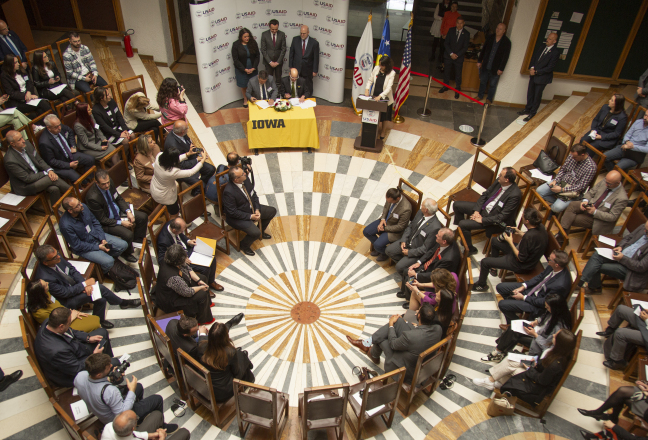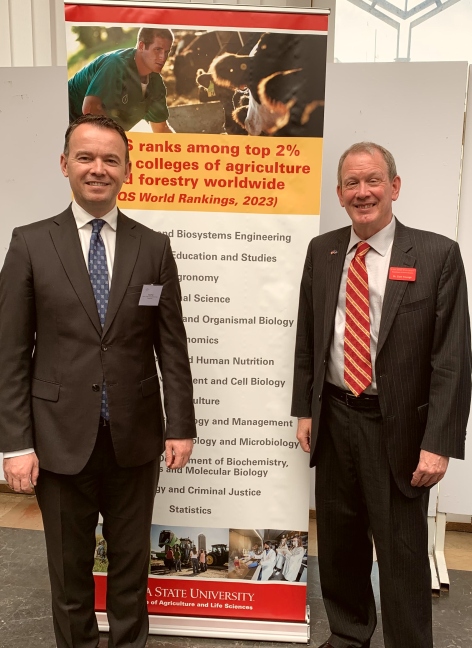
The University of Iowa, in partnership with Iowa State and the Kosova Education Center, announced a five-year, $4 million cooperative agreement with the United States Agency for International Development (USAID) on April 24 in a signing ceremony at the National Library of Kosovo in Pristina. The aim is to improve how three public universities in Kosovo interact with agricultural and information and communication technology companies, leading to more industry-driven research and graduates who are better prepared for the workforce. Photo courtesy of USAID. Larger image.
AMES, Iowa – More than a dozen Iowa State University faculty and staff will be working with colleagues at universities in Kosovo over the next five years to boost the nation’s agricultural economy.
The efforts are part of a $4 million cooperative agreement from the United States Agency for International Development (USAID) to the University of Iowa, which is partnering with Iowa State and the Kosova Education Center, a Pristina-based educational training nonprofit. The USAID-funded activity aims to improve how three public universities in Kosovo interact with agricultural and information and communication technology companies, leading to more industry-driven research and graduates who are better prepared for the workforce.

Faton Peci, Kosovo's minister of agriculture, forestry and rural development, left, with Curtis Youngs, Iowa State's Ensminger Endowed Chair of International Animal Agriculture, at the April 24 launch event. Larger image.
Iowa State experts will lead the efforts to increase collaboration with the agricultural sector, including guidance on topics such as applied research, industry engagement, curriculum development, teaching methods and student services, said Curtis Youngs, ISU’s Ensminger Endowed Chair of International Animal Agriculture and a professor of animal science, who is leading the university’s involvement in the initiative.
The first step will be convening and revitalizing the degree programs’ industrial boards, which are required for accreditation in Kosovo but typically underused, Youngs said. Active industrial boards will help identify potential research priorities and curriculum revisions that would support enhanced student education and economic growth.
“We really want to get these universities working with private companies to solve problems for them,” he said.
ISU faculty plan to travel to Kosovo to share expertise in fields such as horticulture, food science, animal science, agribusiness and agricultural technology, strengthening research programs at “Haxhi Zeka” University in Peja, “Ukshin Hoti” University in Prizren and the University of Prishtina “Hasan Prishtina.” ISU staff will offer guidance on providing students with more hands-on learning, research opportunities, internships and career placement.
“Rather than having them reinvent the wheel, we’re going to say, ‘Here’s what works for us. How can we tweak it to make it work for Kosovo?’” Youngs said. “There are a lot of moving parts that will be coming together.”
Encouraging better connections with the universities should help revitalize Kosovo’s agricultural economy, which has high growth potential. Increased domestic food production is needed to reduce the country’s reliance on imports and improve food insecurity, Youngs said.
Youngs, who has travelled to Kosovo 15 times in the past 11 years, said supporting Kosovo’s universities builds on the longstanding relationship between Iowa and the country of 1.9 million people, which declared independence in 2008 after fighting Serbian paramilitary forces in the late 1990s. Iowa National Guard soldiers were deployed there on peacekeeping missions in the wake of the war, and Iowa and Kosovo established a sister state partnership a decade ago.
“This work will help show how the state of Iowa is a global leader in empowerment through education, and it’s a natural extension of Iowa State's land-grant mission,” Youngs said.
The USAID activity was announced in a launch event April 24 at the National Library of Kosovo in Pristina attended by U.S. Ambassador to Kosovo Jeffrey Hovenier and Kosovo Prime Minister Albin Kurti, along with officials and project leaders from ISU and the University of Iowa.
Cassie Barnhardt, associate professor of higher education and student affairs in the UI College of Education, is the principal investigator leading the project. In Kosovo, the need for high-quality university preparation is paramount, as young people are Kosovo’s most abundant natural resource. Most citizens are under the age of 35, and 42% of the nation is under age 25.
Faculty and staff interaction with university colleagues in Kosovo through mentoring, idea sharing and capacity building will improve opportunities for young people in Kosovo by assuring students have curricular and applied experiences that translate to professional success for themselves and their employers, Barnhardt said.
“Doing so will, in turn, support economic opportunity and strengthen and add stability to one of the world’s youngest democracies,” she said.
Armand Krasniqi, rector of the University of Peje “Haxhi Zeka,” one of the partnering universities, said, "We are delighted to collaborate with scholars from the University of Iowa and Iowa State University to achieve our core objectives of strengthening cooperation with the private sector, increasing the number of internships and improving the employability of our students. We express our sincere gratitude to USAID and are confident that representatives from UI and ISU will share their best practices and knowledge with our staff and students. I firmly believe that this project will have a significant positive impact on Kosovo's society."